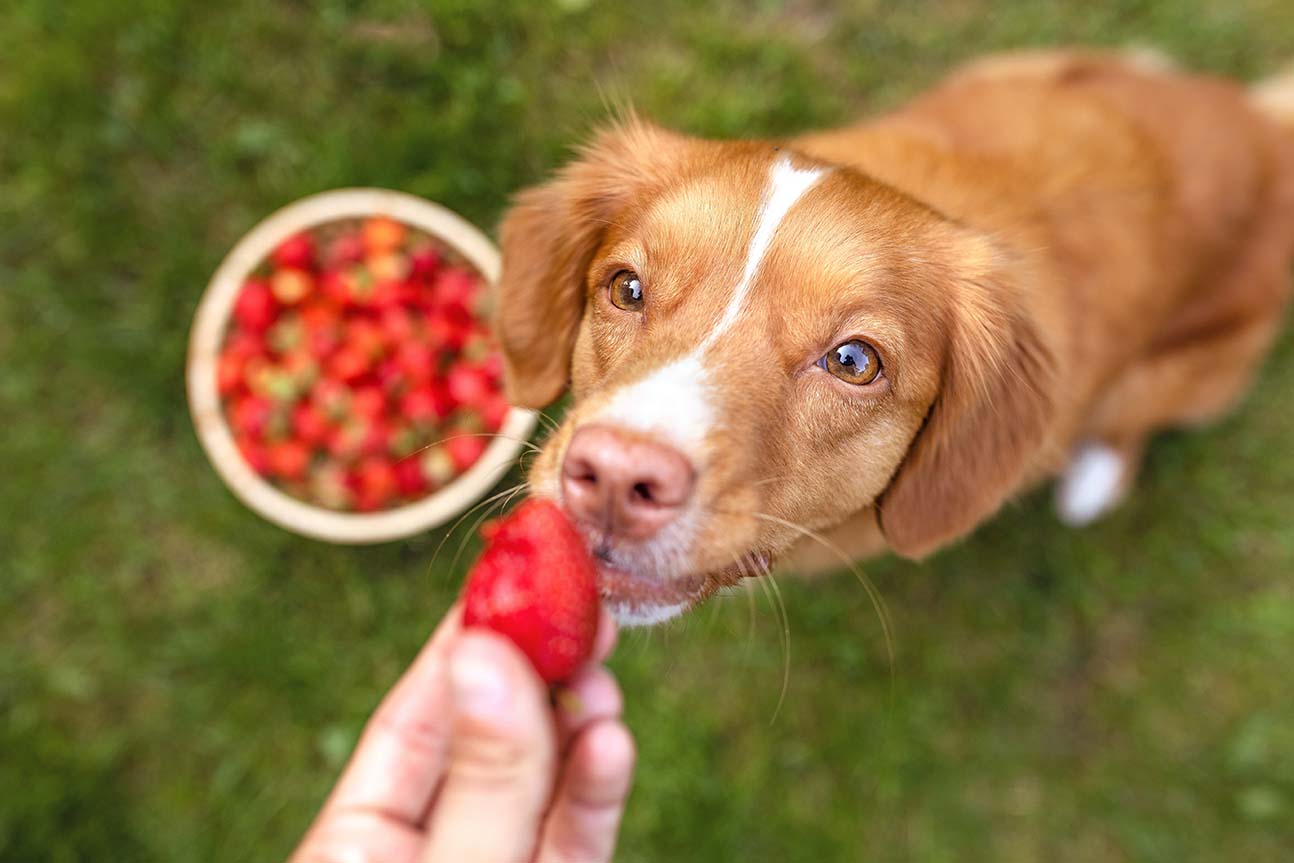Reviewed by Dr. Sarah Yosry
Updated on 24/05/2025
Reading time 4 min.
Overview
Severity: Low
Life stage: All
Dogs are notorious for being curious eaters. If it’s a fallen chip on the kitchen floor or toast on the table, a lot of dogs won’t think twice about gobbling up whatever smells even remotely edible. However, not all that’s safe for human consumption is necessarily safe for dogs. Some human food is so dangerous—that is, potentially even lethal—for our furry friends.
Being a responsible pet owner in Dubai, you must identify which common foods are toxic to dogs. On this page, you will find a list of the worst human foods for dogs, an explanation of what harm they can do, and what you should do if you suspect accidental ingestion. If you’re ever unsure or are having an emergency, calling a vet clinic close by, or an appointment with Modern Vet Hospital Dubai, is what you need.
Why are certain human foods toxic to dogs?
Humans and dogs digest food differently. While our metabolism is capable of processing all sorts of complicated food and chemicals, there are limits for dogs. Dogs cannot metabolize certain compounds, which might appear innocuous to us but are poisonous for them.
For example, xylitol, a ubiquitous sugar substitute, induces rapid release of insulin, which leads to hypoglycemia, or low blood sugar, in dogs. Grapes, which are high in antioxidants for people, are responsible for precipitating a rapid onset of canine kidney failure. That is why knowing food safety is so important, and why veterinary experts recommend against pet owners supplementing pet food with human food.
If you are unsure, check with a veterinary clinic first before introducing a new treat into your dog’s food.
Also, some toxins tend to build up over time. A little taste now and then does not seem toxic, yet repeated exposure to tiny amounts of garlic or sugar substitutes will result in ongoing health complications. Metabolic variations between dogs and people mean even perfectly wholesome human foods are potentially toxic for your pet over a long period.
Worst Human Foods for Dogs
Chocolate
Chocolate is a commonly recognized poisonous food for dogs. Chocolate has theobromine and caffeine, which are poisonous even at low doses.
Dark and baking chocolates contain those stimulants in greater quantities, yet even milk chocolate is harmful if large amounts are taken. The signs of chocolate poisoning are
• Vomiting
• Diarrhea
• Restlessness
• Increased heart rate
• Tremors or seizures
Certain dogs are more sensitive than others based on size, breed, and age. Be extremely cautious and keep chocolate safely out of reach.
If your dog has ingested chocolate, immediately go for emergency treatment at a vet clinic in Dubai or the veterinary hospital closest to you.
Grapes and Raisins
Even a minimal quantity of grapes or raisins is capable of inducing sudden failure of a dog’s kidneys. The identity of the toxic substance is still unknown, though consistent, severe effects are produced. Symptoms usually occur within 12 hours and are a combination of
• Vomiting
• Lethargy
• Loss of appetite
• Dehydration
• Abdominal pain
The damage done by the kidneys occurs rapidly, and waiting longer only lowers the probability of recovery. Don’t use any of the above foods, which include baked items, trail mix, or breakfast cereal, that contain raisins.
If you suspect that your dog has ingested grapes or raisins, every minute counts. Go see a vet close to you or call for emergency assistance at Modern Vet Hospital Dubai immediately.
Onions and Garlic
Allium family members include onions, garlic, leeks, and chives, which are all toxic to dogs. They cause oxidative damage to red blood cells, resulting in hemolytic anemia. They pose a risk whether raw, cooked, powdered, or included with leftovers.
Symptoms of onion or garlic poisoning are:
• Weakness
• Pale gums
• Increased heart rate
• Vomiting
• Collapse
As all of these foods are often used in home preparation and restaurant food, double-check leftovers before you share them with your pet. Even garlic supplements sold for flea control are suspect and should only be used if recommended by a veterinarian.
Xylitol
Xylitol is a synthetic sweetener commonly used in sugar-free gum, candy, baked desserts, and even certain brands of peanut butter. In dogs, xylitol is extremely toxic since it causes a rapid release of insulin, which leads almost immediately to hypoglycemia (low blood sugar).
Severe cases can also lead to liver failure. Signs include:
• Vomiting
• Loss of coordination
• Seizures
• Lethargy
• Collapse
Even a single piece or two of sugar-free gum is toxic for a tiny dog. Be certain to check the labelling before you share any “diet” or “low-calorie” treats.
If you see that your dog consumes anything that says “sugar-free,” check the ingredients right away. Then, find a vet nearby or go directly to a veterinary clinic Dubai.
Beverages with Alcohol and Caffeine
Even limited quantities of alcohol or caffeine are extremely toxic for dogs. They impact the central nervous system and could cause respiratory failure, particularly among small breeds.
Symptoms are:
• Vomiting
• Disorientation
• Tremors
• Hyperactivity
• Elevated body temperature
Dogs must never be given alcoholic beverages, coffee, tea, or energy drinks. Dogs find creamy or sugary drinks extremely appealing and are at risk for unintentional consumption.
In case an accident happens, act immediately and call a pet clinic or a veterinarians nearby.
Cooked Bones
Whereas raw bones are helpful with supervision, cooked bones are hard and tend to splinter. The jagged edges on such bones are capable of:
• Damage to the esophagus or intestines
• Cause choking
• Lead to internal bleeding
• Result in blockages requiring surgery
Most pet owners falsely assume a leftover bone is a treat, however. Cooked bones, however, from chicken, turkey, or even lamb, are particularly hazardous. Instead, speak with your veterinary office about safe chew items designed for your dog’s breed and age.
Macadamia Nuts
Macadamia nuts are extremely toxic for dogs, although the toxicity mechanism is still unknown. Even only five to six nuts are enough to poison a medium-sized dog.
Symptoms are:
• Muscle tremors
• Weakness
• Vomiting
• Fever
• Lameness
Because macadamia nuts are commonly included in cookies and snack blends, there is a silent threat. If your dog has ingested macadamia nuts—by themselves or within cookies—immediate consultation with a vet Dubai or an emergency vet hospital is essential.
Fried Snacks and Fatty Foods
Dogs that eat high-fat human foods such as bacon, sausage, fried chicken, or butter toast are at risk of pancreatitis. Pancreatitis is a painful disease which inflames the pancreas and is potentially life-threatening.
Watch out for
• Repeated vomiting
• Abdominal pain
• Loss of appetite
• Diarrhea
• Fever
Pancreatitis is a serious, treatable and hospitalizable disease. Don’t jeopardize your dog’s health for an instant’s pleasure. Even a tablespoon’s worth of table scraps can be harmful. In case of sign development, call your local vet immediately.
What to Do If Your Dog Eats Something Toxic?
Time is of the essence when your dog eats toxic food. Follow these steps:
• Determine what and how much was consumed.
• Call either your veterinary clinic in Dubai or an emergency pet clinic.
• Follow instructions—don’t induce vomiting unless instructed.
• Schedule an emergency appointment at Modern Vet Hospital if you are based in Dubai.
Bringing the product’s packaging can help the vet treat your dog more effectively.
Safer Alternatives to Share with Your Dog
Instead of risky table scraps, try offering safe and nutritious options, such as:
Plain cooked pumpkin
• Carrot sticks
• Apples (no seeds)
• Plain boiled chicken
• Blueberries
• Unsweetened plain yogurt
These treats help promote your dog’s digestion, immunity, and general health. Add new foods gradually and monitor your pet afterward. For a personal nutrition plan, you can see a reliable veterinarian close by or request assistance from professionals at Modern Vet Hospital Dubai.
Conclusion
The safety of your dog starts with being aware. As tempting as it is to give your pet a taste of what you’re having, doing so without being careful jeopardizes their health. Know what the worst human foods are for dogs so you can avert crises and help your pet live a longer, healthier life.
Be vigilant, read labels, and store harmful foods beyond reach. If unsure, consult with a specialist. Book an appointment today at https://bookme.modernvet.com/ and provide your pet with the quality care they deserve.
Share this, choose your platform!
Writen by
Dr.Sarah Yosry
DVM
A product of a rich Australian/Egyptian heritage, Dr. Sarah Yosry stands as a testament to the union of diverse cultures and a shared love for animals.



